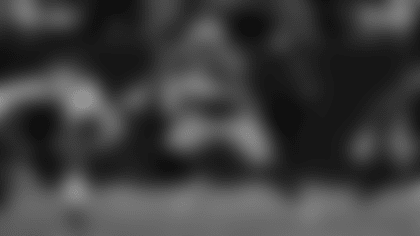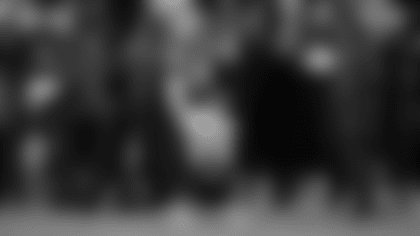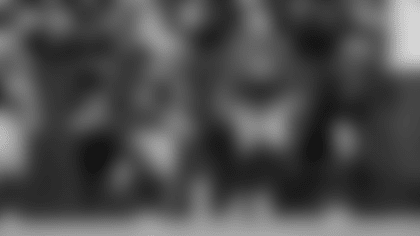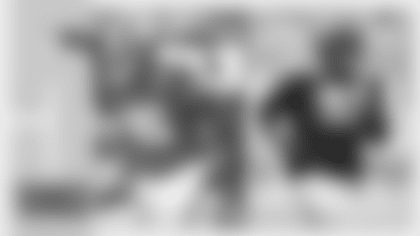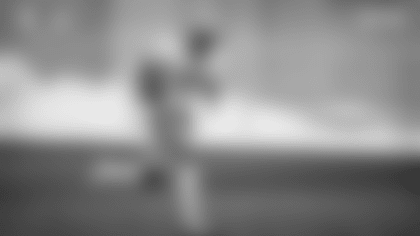S Derrick Martin and LB Desmond Bishop lead Green Bay's special teams with 20 and 19 tackles respectively.
Heading into the game at Chicago two weeks ago, special teams coordinator Shawn Slocum spoke of the need for his kickoff-coverage unit to play fundamentally sound but also fast against one of the top return tandems in the league.
That came on the heels of the Packers allowing a 68-yard kickoff return at a critical point in the game the previous week against Baltimore, the fourth time in 2009 that Green Bay allowed a 50-plus yard return. Slocum's concern was that because of those big returns, some of his coverage men were possibly playing more tentatively for fear of being the player that was responsible for a big gain by the opponent.
Green Bay responded against the Bears with one of its top performances of the season in kickoff coverage, and followed that up with another strong showing last Sunday against Pittsburgh.
Heading into the Chicago game, the Packers ranked No. 25 in the league in kickoff coverage with opponents averaging 24.5 yards per return. But after allowing just a 16.6-yard average the past two games, the sixth-best mark in the league over that span, Green Bay has seen their ranking in that category jump up nine spots.
"I think we are playing with a lot more confidence," said safety Derrick Martin, who leads the team with a career-high 20 special teams tackles this season and posted a career-high five last Sunday in Pittsburgh. "With more confidence you start playing with a little bit more speed, and our play speed is picking up. Guys are really flying around and we know where we are supposed to be.
"I think guys are starting to trust each other. With our scheme, we're not meant to play on our heels. We need to fly around, and guys are starting to play like that. They aren't worried about what is going on on the other side of them. Guys are playing to their keys, and it's just working really well for us."
Like most teams in the league, the Packers have battled some injuries, both to members of its special teams, but also to defensive players that had a trickle-down effect on the coverage units.
"We had the injury to Brett Swain in the Cleveland game, so we had to not just replace one guy, but we had to make two personnel moves to make that adjustment," Slocum said. "Now you've got two new players playing. Then we had some things like Aaron Kampman went down so Brad Jones started playing more defense.
"It doesn't take long where all of a sudden you've got a unit of guys that haven't played a lot together. They can't anticipate what their partner is going to do, so it's like a new beginning. But I think that is a very important part of this league is that you make adjustments quickly and that you're able to be successful making those adjustments."
Chicago entered the game two weeks ago with the top return man in the league in rookie Johnny Knox (29.4 avg.), as well as Danieal Manning, the league's top return man in '08. The duo had helped the Bears to the No. 2 ranking in the league in kickoff returns with a 25.6-yard average to that point, including an NFL-best six returns of 40-plus yards.
The Packers held them well below their season average as the Bears posted just an 18.6-yard average on five returns, limiting Knox to only 12 yards on his one opportunity and Manning to returns of 26 and 27 yards. Wide receiver Rashied Davis fielded two line-drive kicks and returned them for just a total of 28 yards.
Green Bay has utilized a variety of kicks the past two games, with Mason Crosby kicking away on some, while also mixing in squib kicks and low, line-drive boots as well.
"It helps because for a kickoff return to really work, outside of a returner making just a spectacular play, a kickoff return requires the blocking setup and spacing and timing to all synchronize so that the runner has spacing and options where he runs," Slocum said. "When you change the kick and the kick placements, a lot of the time you can disrupt the rhythm and the timing of the setup of the return team."
Facing a Pittsburgh team last Sunday that entered the game with a 24.1-yard average on kickoff returns (No. 10 in the league), the Packers held the Steelers well below their season mark by allowing just a 15.0-yard average on six returns.
The Packers' kickoff coverage unit has had its share of bright spots throughout the season, evidenced by holding opponents to under 20 yards on 32 returns this season, tied for third-most in the league. But unfortunately it was the league-high four returns of 50-plus yards allowed that had garnered them the most attention.
Returns like those hurt a team whenever they happen, but the fact that three of the four came with the Packers trying to hold on to the lead against Tampa Bay, San Francisco and Baltimore only compounded matters. In each of the last two games, the kickoff coverage team found itself facing that same exact situation.
{sportsad300}Against Chicago, the Packers had taken a 21-14 lead on a Ryan Grant touchdown run with less than 13 minutes remaining, and gave up just a 17-yard return to Davis out to the 30. In Pittsburgh, the coverage units had to answer the call twice in the final quarter after taking the lead. The first, after another Grant TD run put the Packers up 28-27, was returned just 21 yards by Stefan Logan. Then with just over two minutes remaining and Green Bay trying to protect a 36-30 lead, a Crosby line-drive kick went past Logan, who returned it just 2 yards.
Even though the Steelers drove 86 yards to win the game on a last-second touchdown pass, the confidence gained from having gone through another pressure-packed situation is something the unit can carry forward.
"I think that it helps a lot with that," said linebacker Desmond Bishop, who ranks second on the team with a career-best 19 special teams tackles. "After we got that score late, we knew we had to kick off. I looked at a couple of guys and was like, 'This is where we usually break down at. Let's not let that happen.'
"We didn't really think about it too much. We were positive about it. We knew that was in the past and it was time to redeem ourselves and correct it. We were just thinking about going down there and making a play."






